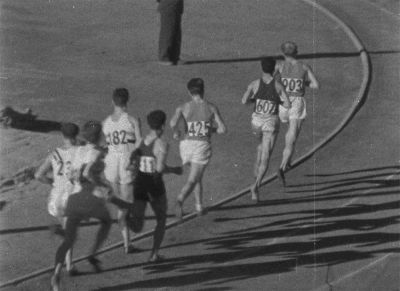
OLYMPIA 52
(Francia/1952) R.: Chris Marker. D.: 104’
F.: Chris Marker, R. Cartier, J . Sabatier, J. Dumazedier. M.: Suzy Benguigui. Int.: Joffre Dumazedier (voce narrante), Paavo Nurmi, Emil Zátopek, Alain Mimoun (se stessi). Prod.: Peuple et Culture. Digibeta. D.: 104’. Bn. Versione francese / French version
Da: INSEP – Institut National du Sport de l’Expertise et de la Performance
La prima parte del film è Helsinki durante le Olimpiadi: lo stadio, la città gli alloggiamenti degli sportivi, ecc... Lì soprattutto, si esercita il gusto dell'autore per gli accostamenti inaspettati, la sua predilezione per i dettagli significativi. La seconda parte del film, la più lunga, è un reportage sulle gare più importanti. Per un non sportivo è spesso fastidiosa, ma molto spesso l'interesse che scema è ridestato dall'aspetto umano di quella data gara, e gli sportivi smettono di es-sere delle macchine per diventare degli esseri umani. Il commento si ferma un istante per salutare un atleta che abbandona, per ricordare che è una carriera che si interrompe, e un vero e proprio omaggio allo sforzo umano si sostituisce a un reportage impersonale. Altrove il tono si fa lirico per celebrare gli exploit di Emil Zátopek, ma è per insistere sul valore morale dello sforzo del grande atleta, per cercare di attenuare la leggenda che fa di quest'uomo una macchina. Infine gli atleti non sono sempre mostrati in pieno sforzo: li vediamo agli allenamenti, e visti da più vicino acquistano un'umanità che lo scenario del grande stadio con la sua folla, le piste impeccabilmente tracciate tendono a volte a dissimulare. Tutto ciò annuncia, ancora timidamente, il carattere profondamente umano dell'opera di Chris Marker, che orienta la macchina da presa verso dei volti piuttosto che verso la folla anonima. Il commento infine preannuncia quelli dei film successivi e, a tratti, la fronte di Chris Marker infrange la maschera ristretta del cineamatore. Non manca niente: lo humour e le citazioni (ad esempio il tentativo della giovane Barbara che interviene all'improvviso al microfono "grondante d'acqua, radiosa sotto la pioggia" per predicare, contro ogni buon senso, la fraternità tra i popoli), un certo lirismo (la giovane atleta nera che, di superlativo in superlativo, diventa al termine della corsa "la piu bella ragazza del mondo"), un'unione profonda tra l'immagine e le parole.
Georges Guy, "Image et Son", n. 161-162, aprile-maggio 1963
The first part of the film is in Helsinki during the Olympics: the stadium, the city, the athletes' accommodation, etc. It is here, in particular, that the director experiments with his taste for an unexpected approach and his fondness for meaningful details. The second, longer, part of the film is a documentary about the most important sporting events. For someone who is not sporty it can be annoying, but the dwindling interest is often revived by the human aspect of the event, the sportsmen and women stop being machines and become human beings. The commentary pauses briefly to bid farewell to an athlete who is leaving, to remind us that a career is ending; a real tribute to human effort replaces the impersonal report. Elsewhere there is a poetic atmosphere to celebrate the Zátopek's feats, but it is done to emphasise the ethical value of the great athlete's effort, to try and soften the legend which suggests that this man is a machine. Finally, the athletes are not always shown fully exerting themselves: we also see them in training, a closer look that achieves the humanity that the scenery of the great stadium, the crowd and the impeccably marked lanes at times tends to conceal. All of this presents, albeit timidly, the deep human character of the film by Chris Marker, who points the camera at the faces rather than at the anonymous crowd. Finally, the commentary previews the following films by Chris Marker, whose forehead at times appears in the shooting. Nothing is missing, the humour and quotes (for example the young Barbara's attempt to suddenly intervene at the microphone "dripping with water, radiant in the rain" to preach, against any common sense, the brotherhood among populations), a certain poetry (the young black athlete who becomes ever more "the most beautiful girl in the world"), a deep union between images and words.
Georges Guy, "Image et Son", n. 161-162, April-May 1963

Tariffe:

Numero posti: 144
Aria condizionata
Accesso e servizi per disabili
Il nostro cinema aderisce al circuito CinemAmico: è possibile utilizzare l’applicazione MovieReading® per i film di cui è prevista audiodescrizione e/o sottotitolazione sull'applicazione.
Tel. 0512195311











